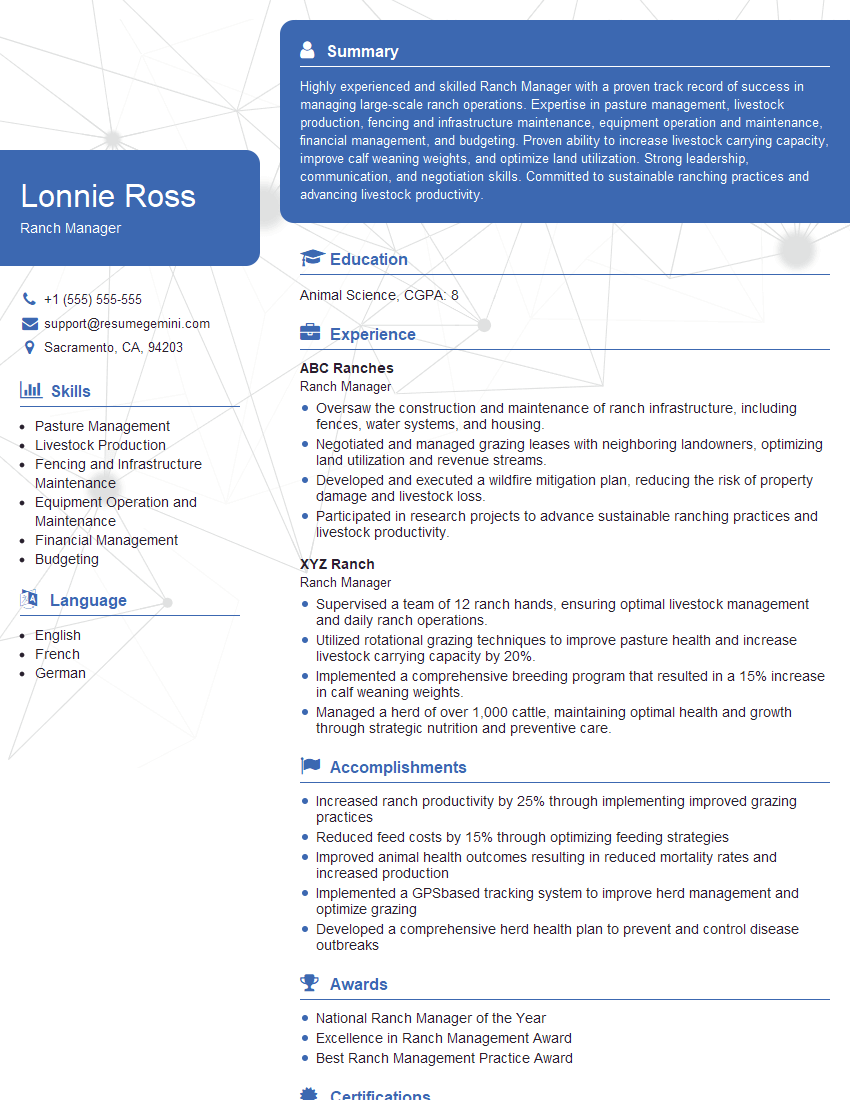Are you a seasoned Ranch Manager seeking a new career path? Discover our professionally built Ranch Manager Resume Template. This time-saving tool provides a solid foundation for your job search. Simply click “Edit Resume” to customize it with your unique experiences and achievements. Customize fonts and colors to match your personal style and increase your chances of landing your dream job. Explore more Resume Templates for additional options.

Lonnie Ross
Ranch Manager
Summary
Highly experienced and skilled Ranch Manager with a proven track record of success in managing large-scale ranch operations. Expertise in pasture management, livestock production, fencing and infrastructure maintenance, equipment operation and maintenance, financial management, and budgeting. Proven ability to increase livestock carrying capacity, improve calf weaning weights, and optimize land utilization. Strong leadership, communication, and negotiation skills. Committed to sustainable ranching practices and advancing livestock productivity.
Education
Animal Science
May 2017
Skills
- Pasture Management
- Livestock Production
- Fencing and Infrastructure Maintenance
- Equipment Operation and Maintenance
- Financial Management
- Budgeting
Work Experience
Ranch Manager
- Oversaw the construction and maintenance of ranch infrastructure, including fences, water systems, and housing.
- Negotiated and managed grazing leases with neighboring landowners, optimizing land utilization and revenue streams.
- Developed and executed a wildfire mitigation plan, reducing the risk of property damage and livestock loss.
- Participated in research projects to advance sustainable ranching practices and livestock productivity.
Ranch Manager
- Supervised a team of 12 ranch hands, ensuring optimal livestock management and daily ranch operations.
- Utilized rotational grazing techniques to improve pasture health and increase livestock carrying capacity by 20%.
- Implemented a comprehensive breeding program that resulted in a 15% increase in calf weaning weights.
- Managed a herd of over 1,000 cattle, maintaining optimal health and growth through strategic nutrition and preventive care.
Accomplishments
- Increased ranch productivity by 25% through implementing improved grazing practices
- Reduced feed costs by 15% through optimizing feeding strategies
- Improved animal health outcomes resulting in reduced mortality rates and increased production
- Implemented a GPSbased tracking system to improve herd management and optimize grazing
- Developed a comprehensive herd health plan to prevent and control disease outbreaks
Awards
- National Ranch Manager of the Year
- Excellence in Ranch Management Award
- Best Ranch Management Practice Award
Certificates
- Certified Ranch Manager (CRM)
- Certified Professional in Animal Science (CPAS)
- Livestock Management Certificate
- Pasture and Range Management Certificate
Career Expert Tips:
- Select the ideal resume template to showcase your professional experience effectively.
- Master the art of resume writing to highlight your unique qualifications and achievements.
- Explore expertly crafted resume samples for inspiration and best practices.
- Build your best resume for free this new year with ResumeGemini. Enjoy exclusive discounts on ATS optimized resume templates.
How To Write Resume For Ranch Manager
- Quantify your accomplishments using specific metrics and data.
- Highlight your leadership and management skills.
- Demonstrate your knowledge of sustainable ranching practices.
- Tailor your resume to each specific job application.
Essential Experience Highlights for a Strong Ranch Manager Resume
- Supervise and manage a team of ranch hands.
- Develop and implement comprehensive livestock management plans.
- Utilize rotational grazing techniques to improve pasture health and increase livestock carrying capacity.
- Implement breeding programs to improve calf weaning weights.
- Manage a large herd of cattle, maintaining optimal health and growth.
- Oversee the construction and maintenance of ranch infrastructure.
- Negotiate and manage grazing leases with neighboring landowners.
Frequently Asked Questions (FAQ’s) For Ranch Manager
What is the primary role of a Ranch Manager?
The primary role of a Ranch Manager is to oversee and manage all aspects of a ranch operation, including livestock production, pasture management, infrastructure maintenance, and financial management.
What are the key skills required for a Ranch Manager?
Key skills for a Ranch Manager include pasture management, livestock production, fencing and infrastructure maintenance, equipment operation and maintenance, financial management, and budgeting.
What are the key responsibilities of a Ranch Manager?
Key responsibilities of a Ranch Manager include supervising and managing a team of ranch hands, developing and implementing livestock management plans, utilizing rotational grazing techniques, implementing breeding programs, managing a large herd of cattle, overseeing the construction and maintenance of ranch infrastructure, and negotiating and managing grazing leases with neighboring landowners.
What are the key challenges facing Ranch Managers?
Key challenges facing Ranch Managers include managing the impact of weather conditions on livestock and pastureland, controlling costs while maintaining profitability, and adapting to changing consumer demands for livestock products.
What is the career outlook for Ranch Managers?
The career outlook for Ranch Managers is expected to be positive, with a projected 11% growth in employment over the next decade.
What is the average salary for a Ranch Manager?
The average salary for a Ranch Manager is around $60,000 per year, but it can vary depending on experience, location, and company size.
What are the education and experience requirements for a Ranch Manager?
Most Ranch Managers have a bachelor’s degree in animal science or a related field, as well as several years of experience in livestock production and management.
What are the key skills for a Ranch Manager?
Key skills for a Ranch Manager include pasture management, livestock production, fencing and infrastructure maintenance, equipment operation and maintenance, financial management, and budgeting.